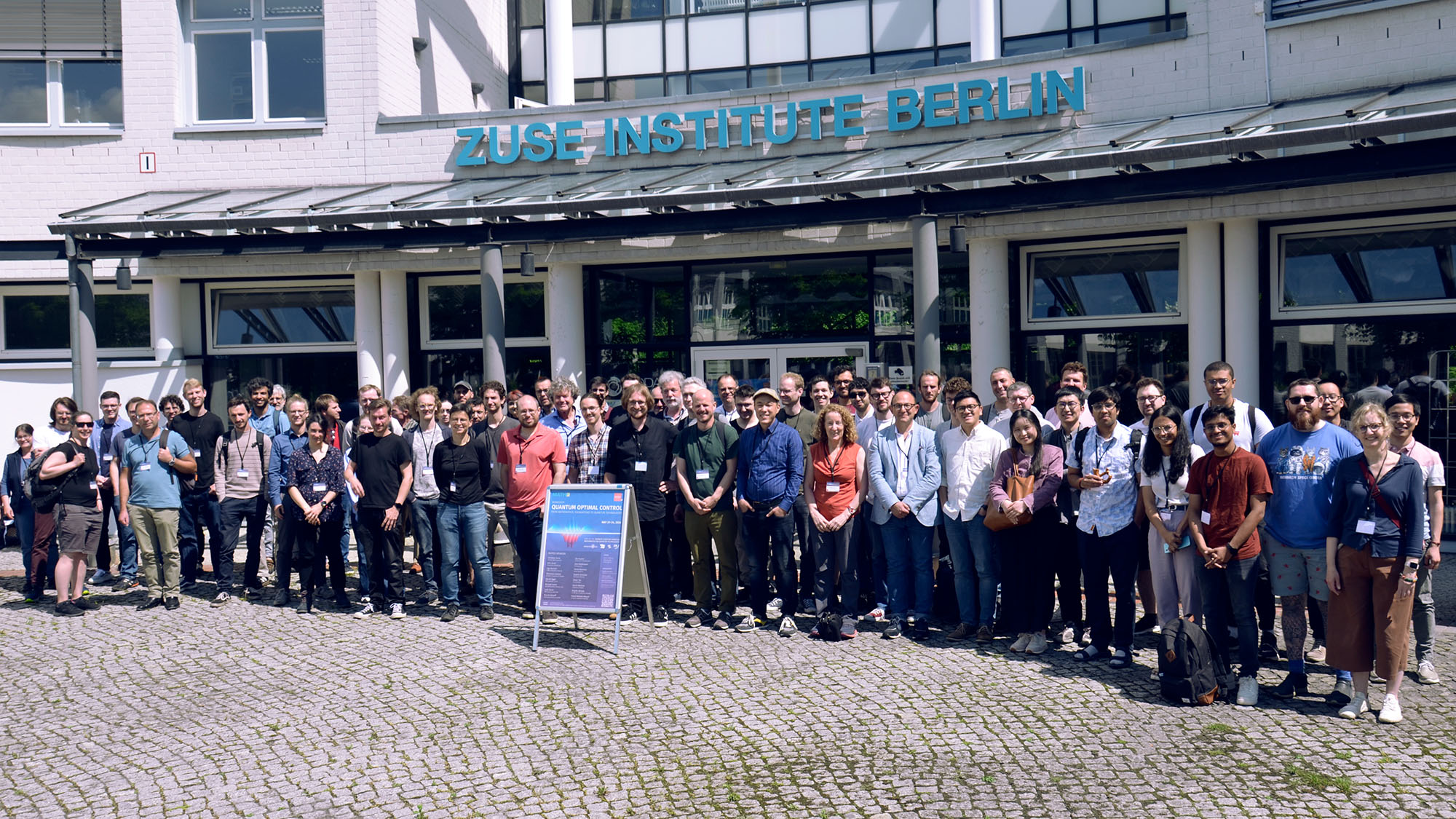Organizers
Tobias Breiten (TUB)
Patrick Gelß (ZIB)
Markus Kantner (WIAS)
Christiane P. Koch (FUB)
This workshop is part of the Thematic Einstein Semester “Mathematics for Quantum Technologies” (Summer 2024) funded by the Cluster of Excellence MATH+ and the Einstein Foundation Berlin. A central objective of the workshop is to promote an exchange between mathematicians, physicists and engineers across disciplines on the subject of optimal control of quantum systems.
Thank You!
Thank you for joining the Quantum Optimal Control Workshop and contributing to this exciting program!

Download photo in high resolution.
Topics
Topics of the workshop include (but are not limited to):
- quantum optimal control algorithms and numerical methods
- quantum feedback control and measurement
- hybrid quantum-classical algorithms
- analysis of controllability and expressivity in quantum control problems
- control of open quantum systems
- PDE-constrained optimization
- applications in quantum technologies
- experimental realizations of optimal control theory
Book of Abstracts
Please find the book of abstracts including all relevant information about the workshop here:
Confirmed Invited Speakers
- Christian Arenz (Arizona State University)
- Alfio Borzì (U Würzburg)
- Ugo Boscain (CNRS, Sorbonne University)
- Tommaso Calarco (FZ Jülich/ U Cologne)
- Daniel Egger (IBM Zürich)
- Michael Goerz (DEVCOM US Army Research Lab)
- Luke Govia (IBM Quantum, Almaden Research Center, San Jose)
- Ronnie Kosloff (Hebrew University Jerusalem)
- Ilya Kuprov (U Southampton)
- Anja Metelmann (KIT Karlsruhe)
- Pierre Rouchon (Mines ParisTech)
- Sophie Schirmer (Swansea University)
- Oliver Tse (TU Eindhoven)
- Carrie Weidner (U Bristol)
- Birgitta Whaley (UC Berkeley)
- Frank Wilhelm-Mauch (FZ Jülich/ U Saarland)
Registration (online)
The registration deadline has already expired.
Registration (on-site)
Registration is mandatory for on-site participation in the workshop.
Registration deadline: April 30, 2024
The registration period has ended prematurely due to the large number of registrations we have received so far. Unfortunately, we cannot accept any more participants.
Poster Session and Welcome Reception
The poster session will take place on Tuesday afternoon (May 21, start: 4.30 p.m.) in the lobby of the Zuse Institute next to the lecture hall. Please bring your printed poster (DIN A0, format: portrait) and hang it up in the slot with your poster number (see list of posters below) during the lunch break.
Social Event
On Wednesday afternoon (May 22, 2–4 p.m.), we will take part in a guided tour across the historic campus Berlin-Dahlem and gain insights into an exciting period in the history of science. The tour starts at the Harnack Haus at 2 p.m.
Meeting point:
Harnack Haus
Ihnestraße 16–20
D–14195 Berlin
You can choose between two tours
- Tour A: 100 Years of Science at “Germany‘s Oxford”
- Tour B: “Science Heaven” Dahlem‘s Nobel Laureates
Both tours are offered with an english speaking guide and will take about 90 minutes. Participants are asked to distribute equally between the tours.
Software-Tutorial
The tutorial will give you a chance to explore numerical quantum dynamics and optimal control through a series of Jupyter notebooks. It will cover basic concepts of light-matter-interaction, tuning control parameters with gradient-free methods, all the way to the optimization of entangling quantum gates with Krotov’s method and GRAPE. There will be examples from a variety of physical systems and at different levels of complexity. Thus, different parts of the tutorial will be suitable for students first dipping their toes into numerical quantum control as well as seasoned researchers wanting to get familiar with some of the latest cutting-edge tools.
We will offer versions of the notebooks in Python and the Julia language. For the most part, these will cover the same material, although Julia will allow to explore more advanced topics, like a comparison of GRAPE and Krotov’s method, larger quantum systems, and modern methods such as automatic differentiation.
For Python, the main packages that will be explored are
- QuTiP – Quantum Toolbox in Python.
- krotov – An implementation of Krotov’s method built on top of QuTiP 4.
- NLopt – A nonlinear optimization package.
For Julia, the main packages are:
- QuantumControl.jl – A Julia framework for quantum dynamics and control. Includes QuantumPropagators.jl, Krotov.jl and GRAPE.jl.
- Optimization.jl – Optimization package (wraps around NLopt and many other optimizers).
Parts of the tutorial will be self-directed, depending on your interests and level of experience. You will be running it on your own laptop. The notebooks and detailed installation instructions will be made available before the workshop.
The tutorial is planned and conducted by Michael Goerz.
Workshop Dinner
We will visit the restaurant Luise Dahlem on Thursday evening (May 23, from 6:30 p.m.). Information on the coverage of costs will be communicated by the organizers during the workshop.
Venue
The workshop will take place in the Lecture Hall of the Zuse Institute Berlin (ZIB).
Address:
Takustraße 7
D-14195 Berlin
Public Transport:
U3 Dahlem-Dorf
S1 Botanischer Garten
Contact and Further Information
Secretariat: Marianne Braun
Arnimallee 14
Room 1.4.33
D–14195 Berlin




